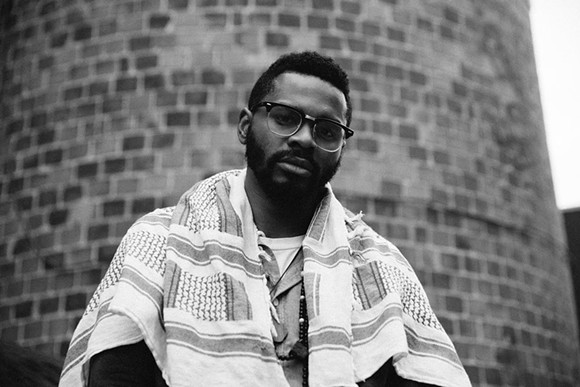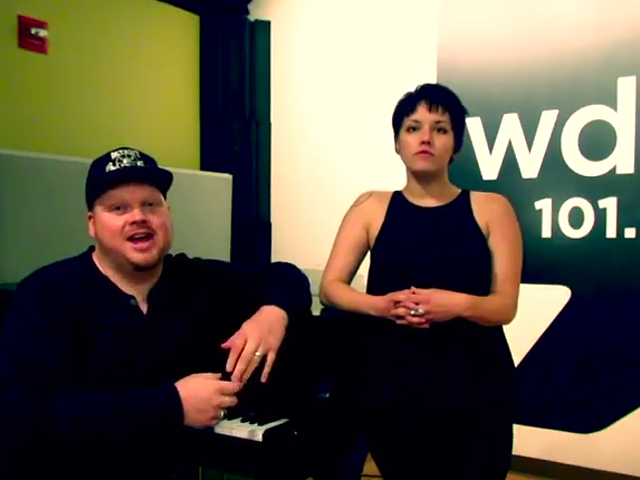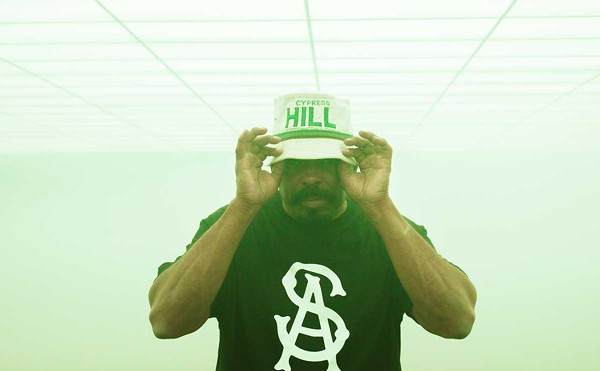Breaking the fourth wall with Detroit MC Jahshua Smith
[
{
"name": "GPT - Leaderboard - Inline - Content",
"component": "35519556",
"insertPoint": "5th",
"startingPoint": "3",
"requiredCountToDisplay": "3",
"maxInsertions": 100
}
]
Metro Times: What’s the name of your new album and when does it drop? How is it different from your previous album?
Jahshua Smith: The name of the new album is The Fourth Wall, slated for release on September 16th. The last album, The Final Season, was based on an inside joke I have with a close friend about how life seems like one big TV show with all the changes we were noticing in life. We ran with that concept, structuring that album like a behind-the-scenes look at a variety TV show as if the songs were skits/monologues similar to what you would see on Saturday Night Live. We used skits in between the songs about "censors" and "ratings" as metaphors for creative interference and commercial appeal, and I like the cohesion the theme gave the product. With The Fourth Wall, the overarching theme is the same, structured as a television show, but with added clarity — as if I'm a character on a TV show breaking the fourth wall, very cognizant of my surroundings and coping with reality and trying to convert that into music.
The last album had a lot of pessimism and finality to it, which I attribute a lot to depression I was feeling at the time, and I wanted it to feel like it could've been my only body of work. The Fourth Wall is more of a redemptive sequel, where I can deal with a lot of the same themes but enough ground to tackle them.
MT: You’ve always been a socially conscious emcee. Why is that? Have you ever worried that your content could limit your overall success as an emcee?
Smith: When I first started working with my good friend James Gardin, he had a song that touched upon the severity of the AIDS epidemic in Africa, and at that point in my career I realized I had been gifted with the opportunity to attend Michigan State and the wealth of knowledge that came with that. Since then, I've felt it was a duty to use my voice to support my people in the fight for social justice. I've been flat out told before that I would never be a big star because of how politically charged some of my music is, but I think every artist should be comfortable in their own skin and I chose to have my career reflect the work I do in the community. Under my old stage name JYoung The General, I released two EPs with Nick Speed called Black History Year (Vol. 1 and 2), where we used hip-hop as a tool to teach important facets of history to new audiences without it seeming corny or akin to an afterschool special. I loved hearing every once in a while that my music was being used in lectures at universities and have some of my own students talk with me about the content.
When I changed my stage name to my real name, I wanted a fresh start. Where I felt limited was that there was a definite plan in place to continue the BHY series, and I felt that betrayed my whole personality. I came to the realization I spent years letting my music showcase me as this nameless hip-hop historian, and no one knew much about my personality, which frustrated me because I had all these struggles and wanted to talk about relationships, mental health, drug use, crises of faith, and I felt there wasn't much capacity to discuss those things. These two albums, The Fourth Wall especially, help me feel like a human being who's well rounded enough to speak on social issues as a part of their life, as opposed to being defined by their knowledge.
MT: Your second single, “Black Diamonds” is lyrically aggressive in how it deals with what’s going on today in black America with the climate of police brutality and overall violence. What moved you to write it?
Smith: My verse is actually six years old. The line "When the streetlights dim, they gon' shoot at anybody with a black or brown skin, not looking like them" was the first concept I had and the original theme was about how police brutality was eventually going to move African-Americans to riot as most oppressed people do when they are cornered. When Oscar Grant was murdered, I re-wrote the verse. When Mike Brown was murdered, it was the first time in my life I felt like there was no answer for these killings. The next morning, I re-wrote it in a different tone. I overheard someone say something about how beautiful Black people, and we're always shining, so I took the metaphor of black diamonds to point that out using different themes like beauty, scarcity, exploitation and appropriation, and how we lose value once people have taken what they want from us — such is the life of a diamond.
MT: How did you team up with Adam Reverie, James Gardin, and Phour The Love?
Smith: For this track I kinda put out an APB with artists that I knew, wanting to have different perspectives on the topic. In an ideal world I would've had a woman on the song as well because one's voice was needed, and maybe a future iteration of the track can make that a reality. I'd heard Adam's work on several websites, and I highly respect his passion and see him in a similar light as a black man who's work shows how he's a dynamic individual also ingrained in social justice work. James was more of a slam dunk, being in the same collective, and we shared ideas of how we could use our voice to address the recurring issue of police brutality. Red Pill's verse was one I figured would be more controversial, but ever since we've been friends I've known him as an ally and I thought it would be strong to show someone articulate the perspective of a person, specifically not a POC, that can not understand the value of black lives without taking a reductive stance like "all lives matter" as a form of erasure. PhourTheLove creating that hook is a testament to who he is as a songwriter. The whole "refrain" of togetherness during the second half feels less like a plea of respectability politics, and more like encouragement that together we can combat these breaches on our way of life.
MT: Who else do you have on your album?
Smith: A couple of my favorite Detroit artists are on the record, Mic Write from Cold Men Young and Nolan the Ninja, as well as some arrangements from my live backing band The Race Card. An immensely talented singer who's like a sister to me, Yellokake, is on a couple of songs, and I also got James and Pill on a couple other songs as well. PhourTheLove is featured heavily on the album, and a lot of my friends are featured in different roles on the skits. I even got my mom to contribute to the project which was huge for me.
MT: How do you feel about the current state of Detroit hip-hop?
Smith: It's interesting, because I've always been an outlier as far as the Detroit scene goes. I like that there are layers where we have bonafide stars like Eminem and Big Sean, and breakout stars in waiting like Dej Loaf and Icewear Vezzo. I like the potential for growth, and it's fun watching a lot of younger talent like Nolan, Richy Marciano, A-Minus, Bevlove, and Sheefy McFly become gatekeepers (so-to-speak) who also provide opportunities on the local/regional level for newer artists to have places to play and build fanbases. I like that there is female representation with young trailblazers like Britney Stoney and Jaye Prime. I like that many of the artists that I love who are a bit older like Guilty Simpson, Phat Kat, Finale, Invincible, and Miz Korona are all accessible, and provide mentorship while still making great music. I love places like Assemble Sound for helping artists refine their craft and bringing people together who may not have collaborated before. I love that we keep our history intact.
What I don't love is the divide, and that like many big cities we tend to fall into our own enclaves and cliques instead of having a network that can provide constant opportunities for people to perform both in and outside the city. I think the olive branches we all wield need to be stronger.
MT: Other than your album, what can we expect from Jahshua Smith in the near future?
Smith: Right now I'm a program director for an organization called All of the Above, founded in Lansing by a fellow emcee Ozay Moore, that uses hip-hop based workshops to engage youth in the community and provide mentorship. We're always traveling to other cities to do the work, so people will see me frequently carrying out the work. I've also started to map out new projects so music will be consistently released over these next couple years. I truly feel like my career is fully in the second gear, and I'm excited to see what the future holds!







